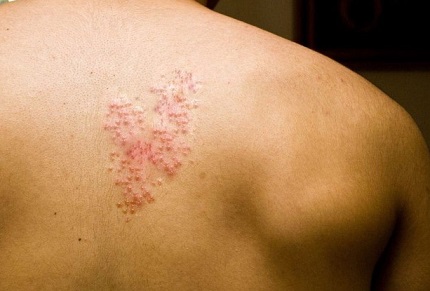Danish Study Finds That Herpes Zoster Risks Linked to Usage of Janus Kinase Inhibitors in Dermatology Patients
Nikhil Prasad Fact checked by:Thailand Medical News Team Nov 04, 2024 5 months, 1 week, 4 days, 19 hours, 57 minutes ago
Med News: Researchers from the Department of Dermatology and Allergy at Copenhagen University Hospital in Denmark have unveiled insights about the infection risks associated with Janus Kinase (JAK) inhibitors, particularly for dermatology patients. Their findings, published in a recent study, underscore a heightened risk of herpes zoster (also known as shingles) and other infections in patients undergoing treatment with these inhibitors, especially for dermatologic conditions.
 Danish Study Finds That Herpes Zoster Risks Linked to Usage of Janus Kinase
Danish Study Finds That Herpes Zoster Risks Linked to Usage of Janus Kinase
Inhibitors in Dermatology Patients
Janus Kinase Inhibitors and Their Role
JAK inhibitors work by blocking enzymes linked to inflammation, which helps manage symptoms in diseases like rheumatoid arthritis, psoriasis, and atopic dermatitis. While these drugs offer relief, they also weaken the immune system, potentially increasing infection risks. This
Med News report highlights that the researchers conducted a systematic review and meta-analysis of placebo-controlled trials, aiming to clarify these risks by comparing JAK inhibitor-treated patients with those receiving a placebo.
Comprehensive Data Analysis
The study reviewed data from 26 clinical trials involving 9,389 patients, with the goal of understanding the infection risks specific to JAK inhibitor therapy. It examined the occurrence of various infections, including viral, fungal, and bacterial infections. The analysis revealed that, overall, JAK inhibitors increased infection risks by 39% compared to placebo. Notably, infections affected 24% of JAK inhibitor-treated patients versus 14.75% of those on placebo. A critical observation was the increased risk of herpes zoster infection in dermatologic patients.
Significant Findings in Dermatologic Conditions
Patients treated with JAK inhibitors for dermatologic conditions experienced a 46% higher risk of infections than those given a placebo. When the focus shifted to herpes zoster, the risk was even more pronounced, with JAK inhibitor-treated dermatology patients showing more than double the likelihood of developing herpes zoster compared to placebo. This insight is pivotal for dermatology patients, especially those with atopic dermatitis, as they appear particularly susceptible to this viral infection.
Distinctions in Non-Dermatologic Indications
For non-dermatologic indications, the infection risk increase was less significant. In fact, there was no substantial rise in herpes zoster cases among these patients, indicating that the infection risks associated with JAK inhibitors may vary depending on the medical condition being treated. This discrepancy highlights the need for cautious and condition-specific risk assessments when prescribing JAK inhibitors.
Infection Risks Associated with Different JAK Inhibitors
The study also analyzed individual JAK inhibitors, such as abrocitinib, baricitinib, ritlecitinib, and tofacitinib,
and their associated infection risks. Although the study did not find significant differences in infection rates among these drugs, the infection rates observed with abrocitinib suggested a potential higher risk, particularly for respiratory infections. However, this trend requires further study to reach definitive conclusions.
Examining the Mechanism of Increased Infection Risk
The researchers noted that the increased risk of infections aligns with the immunomodulatory effects of JAK inhibitors, which disrupt key immune signaling pathways. This disruption leads to a weakened immune response, making patients more susceptible to infections. The authors highlighted that these immunosuppressive effects, though beneficial in managing inflammatory diseases, come with infection-related side effects that healthcare providers should monitor closely.
A cohort study in 2019 observed that patients with rheumatoid arthritis treated with JAK inhibitors experienced gradual decreases in lymphocyte counts, which are crucial for fighting infections. This reduction in immune cells potentially explains the higher infection rates among JAK inhibitor users.
Clinical Implications for Physicians and Patients
Physicians should be particularly vigilant in monitoring infection risks among dermatologic patients prescribed JAK inhibitors. With herpes zoster representing a significant risk, especially in atopic dermatitis patients, pre-treatment vaccination against the virus could be beneficial. Physicians are also encouraged to assess each patient’s unique risk factors, including age, underlying health conditions, and disease severity, to make personalized treatment plans.
For patients, understanding the potential risks associated with JAK inhibitors can help in making informed treatment decisions. This awareness is especially crucial for those with dermatologic conditions, as the increased risk of herpes zoster may impact their quality of life.
Concluding Remarks
The study’s findings suggest that JAK inhibitors, while effective for managing immune-related diseases, carry a notable risk of infections, particularly for patients with dermatologic conditions. Prospective studies are essential to provide real-world evidence on the long-term safety of these drugs.
The study findings were published in the peer-reviewed journal: JAAD International.
https://www.sciencedirect.com/science/article/pii/S266632872400169X
For the latest
Med News, keep on logging to Thailand Medical News.
Read Also:
https://www.thailandmedical.news/news/somnolence-and-shingles-seems-to-be-new-symptom-manifestation-of-covid-19-kp-3-and-lb-1-infections
https://www.thailandmedical.news/news/study-shows-that-post-covid-individuals-have-a-59-percent-risk-of-developing-herpes-zoster-or-shingles
